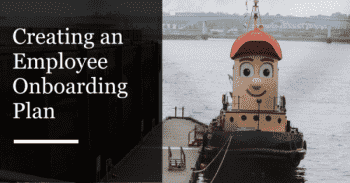Onboarding is something most companies skate by on, despite all the research that connects it to higher engagement, retention, and performance. This makes it a great way to shine against the competition when you're looking for talent.
Don't believe me?
Half of all senior outside hires fail within 18 months in a new position
And:
Employees who went through an improved onboarding program were fully productive two months faster than employees in a traditional program
And it's not just knowledge, but also connections and communication:
According to one estimate, 60 percent of managers who fail to onboard successfully cite failure to establish effective working relationships as a primary reason
Here's a treasure trove of other useful information: Onboarding New Employees: Maximizing Success (pdf)
The goal of onboarding
As managers, our success is measured through the impact our team or department has against the goals of the company. Good onboarding helps our new employees get up to speed sooner, perform at a higher level faster, engage with the company better, and stay longer.
We're enabling employees to do their best work, in service to the companies goals, sooner.
To do this, we have to provide information on the basics of being an employee for our company, clear expectations for what a highly effective developer looks like in our organization, and the information and tools to get from day zero to that highly effective state.
This is not just for big companies
Onboarding is not just for big companies. If you're in startup mode and hiring developer 2-5, what's it worth to have them all up to speed 3 months sooner?
It may not make sense to have a strong onboarding plan when you're small, or it may be crazy to go without one. It depends where you're priorities are. Here are some good questions to ask:
- How much will the company change between this hire and the next?
- How experienced/proactive are the incoming folks?
- Are you hiring them for immediate impact or to be up to speed in 6 months?
Your option isn't all or none, look through the sections below and linked resources and decide where the balance should be for your needs now (and then revisit every 6-12 months to see if that's changed).
Building the Plan
The actual work behind building the plan is covered well in several other resources, like this one: The Ultimate Guide to Structuring a 90-Day Onboarding Plan
Rather than re-tread it, I'm just going to include some additional thoughts I incorporate into my own process.
1. The Plan is a Template
Treat your onboarding plan as a template. We're building the list of knowledge and interactions that would accelerate a generic developer coming on board, but we don't hire generic developers. So we'll start with the template, but sit down and customize it with the new developer to better fit their experience level, existing domain knowledge, types of successes they feel have been a product of their best work, and so on.
2. Avoid "one plan to rule them all"
A company-wide framework, training, or talent team can provide some really valuable experience and input while creating your onboarding process, but beware the "one plan to rule them all" approach. While it's better than no onboarding at all, falling back on a one-size fits all approach starts by ignoring everything unique about your new hires. It's a lazy trade for the benefit of the hiring manager over the good of the company and new employee..
Research agrees (pdf), individuals onboarded with processes focused on their unique perspectives and identities first, rather than fitting them to the organizational identity, were 21% more likely to be retained.
3. De-stress the first day
For a company, the first day a new employee shows up is a checklist of "buy a computer", "add an email account", etc. For a new employee, it's a life-changing event that may have kept them up all night with anxiety.
One of my Pre-"Day 1" onboarding steps is to send out an email that reinforces how excited we are that they accepted (again, we've hired a unique individual that will bring new strengths to the org, not a cog), suggests a starting time, offers advice on traffic hot spots, and so on. For one organization, I also pointed to some extremely optional reading and video material along with how it was relevant to either our technical stack or organizational culture.
Some folks will strike up an ongoing conversation, some won't. In either case I'd send a follow-up the day before they start, forwarded from the first email so it was handy if they had last minute jitters and needed the google map again.
4. Don't gift Sales books to Developers
There are likely a lot of books, videos, and articles that have helped shape your culture, the direction of the company, and more. Make them available as part of onboarding, but don't hand them out as gifts.
Gifts are about the giftee, so these aren't gifts
There is no context, so the first thought a Developer will have on receiving a a book with "Sales" in the title is to wonder if the company gets developers at all
Celebrating folks first day is fine, just make sure you're actually celebrating them, not yourself.
5. Onboarding Buddies
In several organizations, I've seen having an assigned onboarding buddy be both beneficial and not beneficial. Having a peer that is their designated guide has been most helpful when the peer:
- Actively understood the goals of the onboarding
- Was involved in improving the onboarding process
- Had management support that onboarding was their first priority
And least helpful when:
- There was a poor connection between the peers
- The onboarding buddy was passive about the process and goals
- The onboarding buddy treated their role as purely Q&A and/or code reviewer
As with all things, unless the onboarding buddy has a clearly defined role, goals, and autonomy to work towards success, it's likely going to be a net loss for the process.
Links
I included 3 links above that I think are excellent resources for explaining the value of onboarding, building a plan, and ensuring it raises up the individual rather than treat folks as fungible cogs. Here they are again:
- Onboarding New Employees: Maximizing Success (pdf)
- MIT Sloan Management Review: Reinventing Employee Onboarding (pdf)
- The Ultimate Guide to Structuring a 90-Day Onboarding Plan
Additionally, The First 90 Days (amazon) is an excellent book on building customized 90-day plans. It's focused more on managers and executives, but the models and advice can be extremely useful for any role in a growing organization.


